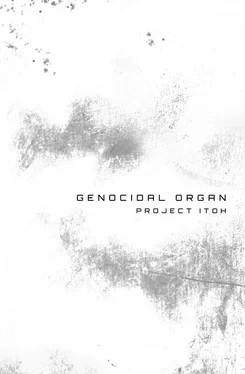Project Itoh - Genocidal Organ
Здесь есть возможность читать онлайн «Project Itoh - Genocidal Organ» весь текст электронной книги совершенно бесплатно (целиком полную версию без сокращений). В некоторых случаях можно слушать аудио, скачать через торрент в формате fb2 и присутствует краткое содержание. Год выпуска: 2012, ISBN: 2012, Издательство: Haikasoru/VIZ Media, Жанр: Старинная литература, на английском языке. Описание произведения, (предисловие) а так же отзывы посетителей доступны на портале библиотеки ЛибКат.
- Название:Genocidal Organ
- Автор:
- Издательство:Haikasoru/VIZ Media
- Жанр:
- Год:2012
- ISBN:9781421550886
- Рейтинг книги:4 / 5. Голосов: 1
-
Избранное:Добавить в избранное
- Отзывы:
-
Ваша оценка:
- 80
- 1
- 2
- 3
- 4
- 5
Genocidal Organ: краткое содержание, описание и аннотация
Предлагаем к чтению аннотацию, описание, краткое содержание или предисловие (зависит от того, что написал сам автор книги «Genocidal Organ»). Если вы не нашли необходимую информацию о книге — напишите в комментариях, мы постараемся отыскать её.
Genocidal Organ — читать онлайн бесплатно полную книгу (весь текст) целиком
Ниже представлен текст книги, разбитый по страницам. Система сохранения места последней прочитанной страницы, позволяет с удобством читать онлайн бесплатно книгу «Genocidal Organ», без необходимости каждый раз заново искать на чём Вы остановились. Поставьте закладку, и сможете в любой момент перейти на страницу, на которой закончили чтение.
Интервал:
Закладка:
“Yes. That there is a grammar to genocide.”
I didn’t understand.
John Paul saw my incomprehension and explained. “Whatever the country, the political climate, or the syntactical framework of the language used, the data always showed that there was one thing in common: a deep structure of the grammar of genocide. There were always certain patterns in the media of a society that was about to start committing genocide, present in its newspaper articles, radio and television broadcasts, even the novels and short stories published. We’re talking about at a deep structural level, not something noticeable in the surface structures that non-linguists are used to accepting at face value. In other words, only a trained linguist who was specifically looking for these patterns would ever have been able to find them.”
The grammar of genocide.
A predictor of atrocities to come.
I couldn’t believe it. “Language is something humans learn. It’s the result of acquired learning. A posteriori knowledge. It’s just language. It can’t affect people’s souls in such a fundamental way,” I said.
“Ah, the old tabula rasa canard. Touching to think that there are still people who believe it. The human mind is a blank slate? I suppose next you’ll be telling me that autism is caused by people not receiving enough love and affection when they were children.”
“Isn’t it?” I asked.
“Genetics predetermine most things about the way a person turns out, from their personality to any physical or mental handicaps, even down to their political leanings. Environmental factors play a marginal role at best. There are those who have tried to argue that human beings are purely a product of their environment, and that all people are essentially born equal. Well, I’m an egalitarian myself, and I believe that it’s a uniquely human trait to be able to transcend our genetics by creating this concept called ‘culture.’ But I can’t allow my belief in the potential of humanity to muddy the objective results of my scientific inquiry. All I’m saying is that every human action has a source, with perfectly good biological and neurological explanations. We need to start by acknowledging to ourselves that we are no more than bundles of flesh assembled according to a genetic code. Our livers and bowels and kidneys were made according to a predetermined genetic formula, so why should there be a special exemption for our minds or hearts, or anywhere else we choose to believe our mysterious spirit might reside?”
I thought of Lucia’s words that the human heart was a product of evolution.
Had she just been regurgitating John Paul’s philosophy?
The thought made me sick to the core.
“But the language that a child learns while growing up is the language spoken by the people around him,” I said. “It’s not as if babies are born with Esperanto carved into their brains or anything. Isn’t that what scholars mean when they call linguistics an a posteriori discipline?”
“No. Let me give you an example. Back when slavery was still legal, the old plantation owners could have cared less what sort of language their slaves spoke. The slaves had been abducted from all four corners of Africa and were just thrown together to work, regardless of whether they had any language or culture in common. Now, this state of affairs wasn’t going to last for long. Soon, the slaves started picking up fragments of their masters’ language—English. But their version of the language was much more simplistic than the original and grammatically all over the place, but at the same time much more rigid and restrictive than English. You couldn’t change word order in a sentence or collocate words easily, for example. In its first generation, this was called Pidgin English.”
John Paul took a deep breath, readying himself to continue his lecture.
“The children of those slaves grew up with Pidgin English as their mother tongue. When they interacted with other ‘native’ pidgin speakers, interesting things started happening: the language started shifting from the rigid original toward a much livelier and more fluid language. A more naturalistic grammar emerged. Grammatical rules that the parents had never used started coming into play, effectively invented by the children. This new language was based on English but was definitely not a language developed by people who had grown up listening to the original. Linguistically and grammatically speaking it was an entirely new language that developed out of a pale imitation of the original. Today it’s called Creole. The children, in other words, acquired a sophisticated grammar that eluded their parents. The only convincing explanation for this is that the human brain has an inherent ability to generate its own grammar out of the linguistic components it has on hand.”
“And that’s what you mean by deep structure—our innate grammatical potential?” I asked.
“Yes, an ability seared into our brains by our genetic code. An organ that gives birth to language.”
A built-in organ inside our brain that gives birth to language.
The organ that contains the portents of massacres.
I was starting to understand. “So DARPA was interested in your research because they figured that if there was a hidden grammatical code inside the human mind that led to chaos and disorder, then they might be able to preempt outbreaks of genocide by monitoring and analyzing communications in countries that were already known to be politically and ethnically unstable.”
John Paul nodded. “As my research progressed, I soon became able to identify omens of escalating violence in patterns of language that people used to communicate with each other. It wasn’t something that you could identify from individual conversations, but rather something that happened at the structural level of a society. You could even see it in the language used by the society’s victims. You can see it in the discourse of the Jews who lived in the Third Reich, for example. And to get a true picture you need to perform frequency analysis on an entire region. What you end up seeing is an outbreak of a particular type of change inside the minds of people who’ve been subjected to this discourse over an extended period of time. Specifically, the part of the brain that makes certain value judgments becomes inhibited. That thing that we have come to call ‘conscience’ becomes twisted. Biased, if you will, in a certain direction.”
John Paul had said enough. The horrific logical conclusion to his story was now looming before me.
I wondered when he had experienced his “eureka” moment. When he lost his wife and child? Or when he was with Lucia replaying that initial report of the news from Sarajevo over and over?
After a pause, I timidly ventured my conclusion. John Paul’s conclusion.
“So you wondered which came first, the chicken or the egg …”
John Paul smiled. “Just so.”
Genocide could be predicted by the frequency of certain types of deep grammatical structures used within a country’s discourse.
So what would happen if you took a stable country where no such discourse was happening and somehow deliberately increased the frequency of this type of deep grammatical structure?
What would happen to a region when its people started speaking with the grammar of genocide?
You’d have to be a lunatic even to consider it , I thought. It was an idea that might crop up during the course of research—a whimsical hypothesis, a joke almost. But you wouldn’t actually try it out. How could you, for starters? As John Paul had said, this wasn’t a hypothesis that manifested itself on an individual level, only at the level of a whole society. You’d need to be able to influence public discourse on a massive scale—the logistics were mind-boggling.
Читать дальшеИнтервал:
Закладка:
Похожие книги на «Genocidal Organ»
Представляем Вашему вниманию похожие книги на «Genocidal Organ» списком для выбора. Мы отобрали схожую по названию и смыслу литературу в надежде предоставить читателям больше вариантов отыскать новые, интересные, ещё непрочитанные произведения.
Обсуждение, отзывы о книге «Genocidal Organ» и просто собственные мнения читателей. Оставьте ваши комментарии, напишите, что Вы думаете о произведении, его смысле или главных героях. Укажите что конкретно понравилось, а что нет, и почему Вы так считаете.












